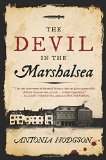Summary | Excerpt | Reviews | Beyond the Book | Readalikes | Genres & Themes | Author Bio

'Conscience makes ghosts walk, and departed souls appear . . . it works upon the imagination with an invincible force, like faith.'
— Daniel Defoe, The Secrets of the Invisible World Disclos'd, 1729
'Arose about four. In the Park I saw half a Dozen Crows in very hoarse conversation together, but not understanding their Language I cou'd not devise what they were upon, but believe they was agreeing how to divide the Corps of those unhappy wretches that Dye so briefly in this Place.'
— John Grano, A Journal of My Life while in the Marshalsea, 1728–9
HISTORICAL NOTE
The Devil in the Marshalsea is set in the autumn of 1727 in London and Southwark, which was generally regarded as a separate town at the time. King George I had died in June. His son, George II, was now king, although he was not crowned until October. People were curious to discover what sort of a monarch he would turn out to be. (A philistine and a buffoon, if we are to believe Lord Hervey, the waspish chronicler of court life.)
The Marshalsea of 1727 is not the same prison that Dickens depicted so brilliantly in Little Dorrit. This second gaol was not opened until the turn of the 1800s and was situated further down Borough High Street. The original prison had existed since at least the fourteenth century and was set between Mermaid Court and what is now Newcomen Street.
In 1720 Britain suffered its first great modern economic catastrophe – the collapse of the South Sea Company. Thousands were ruined when the company's stock plummeted and the devastating effects were still being felt seven years later. The London Gazette of 17–19 September 1727 was filled with commissions of bankruptcy and death notices calling on creditors to confirm any debts owed. (Not everyone was suffering.
There was also a page with instructions to peers and peeresses on their coronation robes, detailing how much ermine they could wear.)
London's debtors' prisons were packed – which spelled misery for thousands and a splendid business opportunity for men such as William Acton, head keeper of the Marshalsea. Debtors' prisons had been common in England for centuries. While the gaols were ultimately owned by the Crown they were privately run for profit. Debtors who had satisfied their creditors would often languish in prison for years because they had run up further debts to the gaol keeper.
It may seem odd that there was so much money to be made from debtors – until we see adverts for pay-day loans and realise there are still plenty of ways to profit from someone else's misfortune. Many prisoners were supported by family and friends, or could pawn belongings while they looked for ways to pay off their creditors. Some even ran businesses from inside the prison walls – Sarah Bradshaw's coffeehouse and Mack's chophouse being two examples. 'Women of the town' were regular visitors. And there was indeed a barber called Trim and – exotically enough – a French fortune teller called Madame Migault living in the Marshalsea in 1727. Debtors' prisons were meant for containment rather than correction – if you could afford to pay for food, drink and company so be it, as long as the keeper got his cut.
Dinner and Supper
A small note to avoid confusion: in the early eighteenth century dinner was usually eaten at around 2 or 3p.m. followed by a light supper later in the evening if needed. All the meals referred to in the novel are based on dishes described in John Grano's diary written in the Marshalsea in 1728–9. And yes – they really did drink and smoke that much back then.
Swearing
Excerpted from The Devil in the Marshalsea by Antonia Hodgson. Copyright © 2014 by Antonia Hodgson. Excerpted by permission of Mariner Books. All rights reserved. No part of this excerpt may be reproduced or reprinted without permission in writing from the publisher.
The low brow and the high brow
Click Here to find out who said this, as well as discovering other famous literary quotes!
Your guide toexceptional books
BookBrowse seeks out and recommends the best in contemporary fiction and nonfiction—books that not only engage and entertain but also deepen our understanding of ourselves and the world around us.